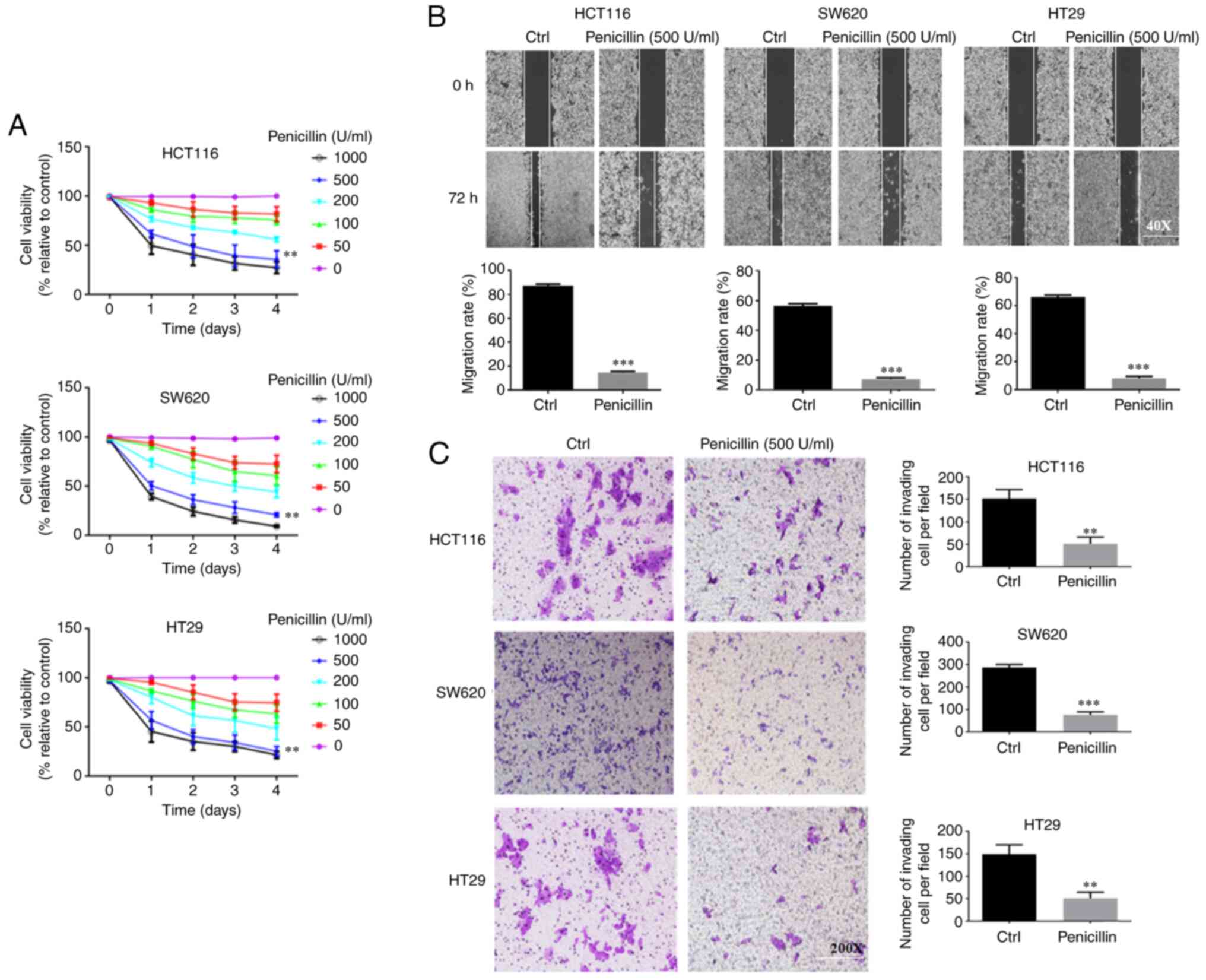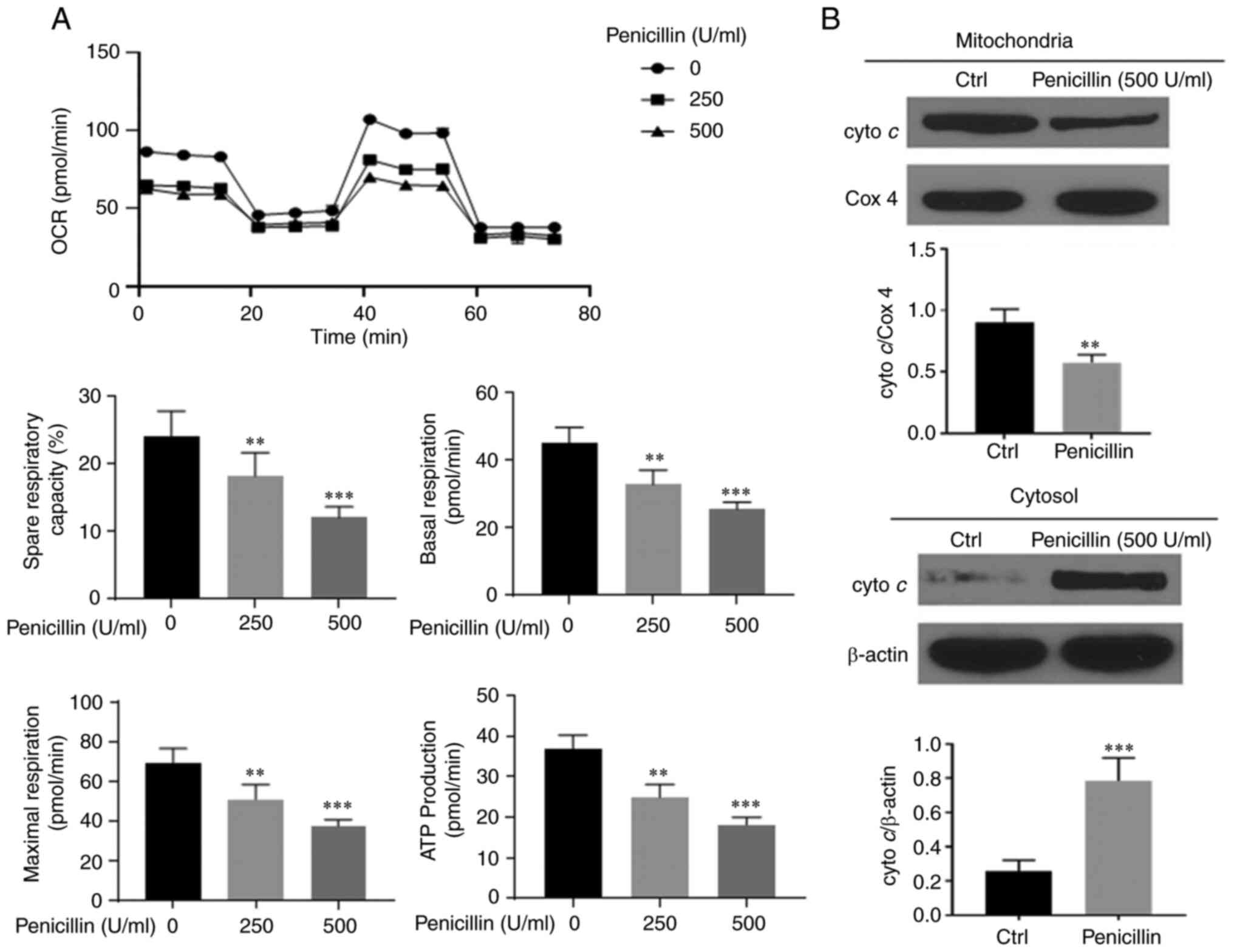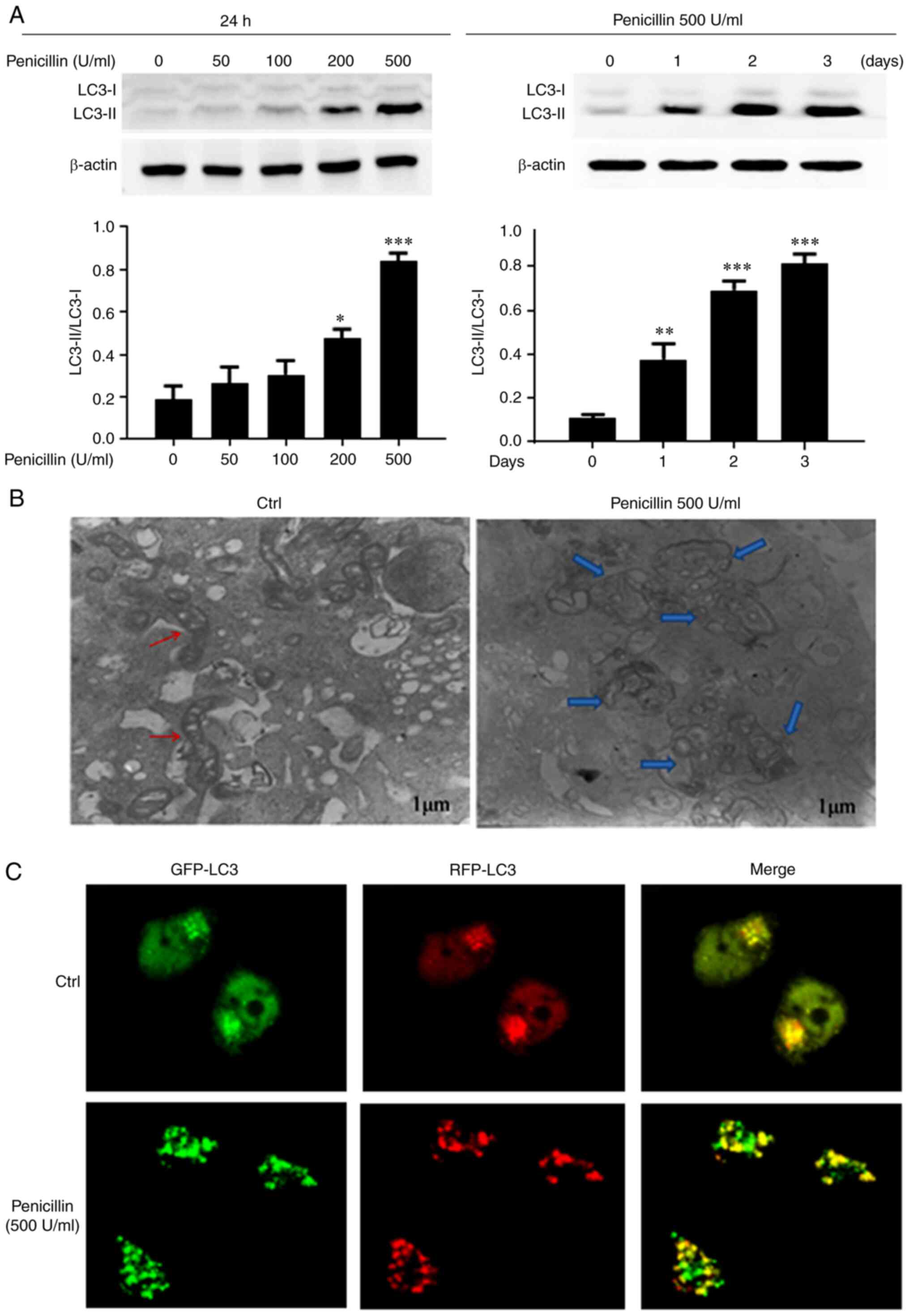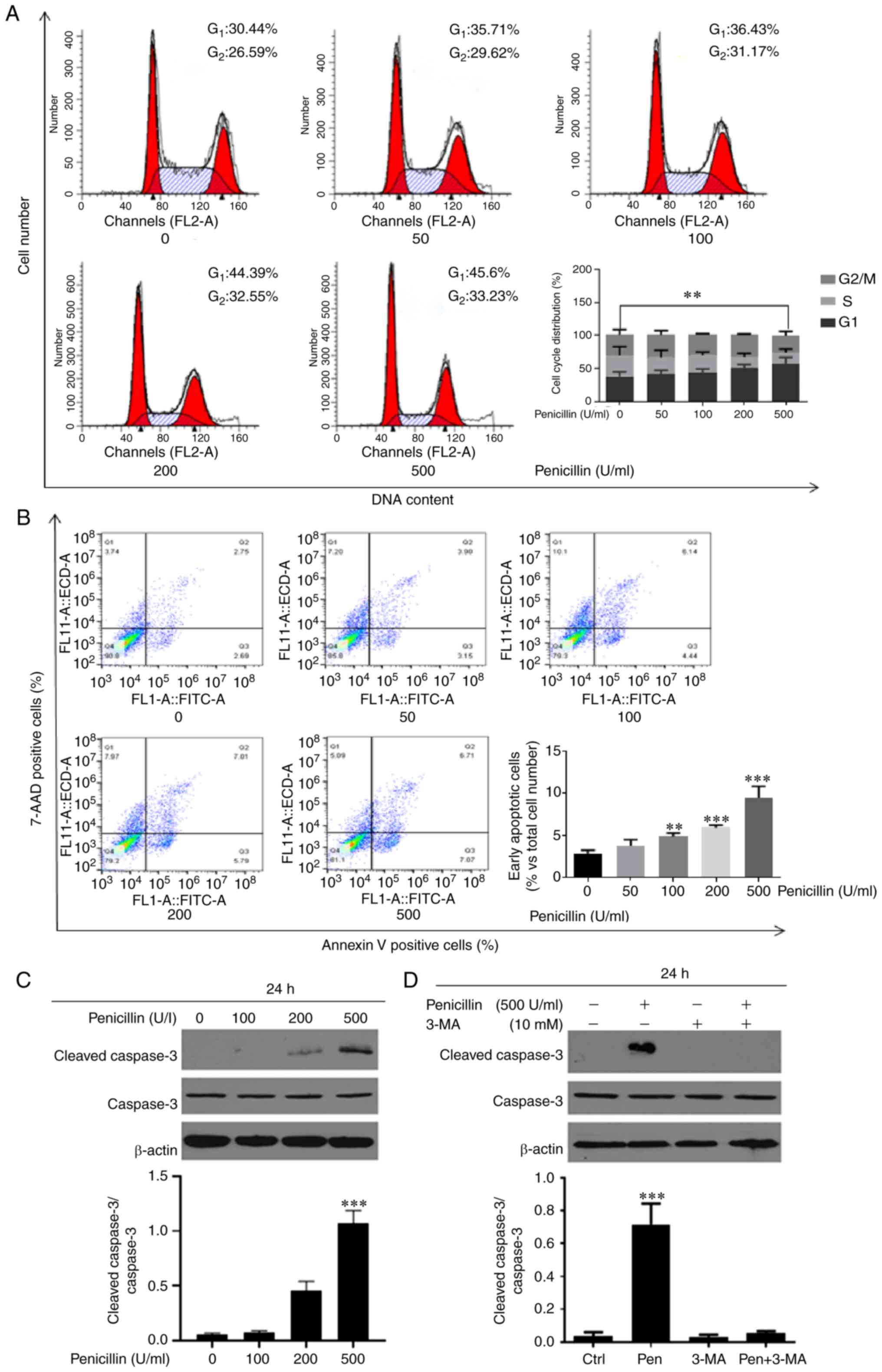|
1
|
Kitahara CM, Berndt SI, de González AB,
Coleman HG, Schoen RE, Hayes RB and Huang WY: Prospective
investigation of body mass index, colorectal adenoma, and
colorectal cancer in the prostate, lung, colorectal, and ovarian
cancer screening trial. J Clin Oncol. 31:2450–2459. 2013.
View Article : Google Scholar : PubMed/NCBI
|
|
2
|
Ji Q, Zhang L, Liu X, Zhou L, Wang W, Han
Z, Sui H, Tang Y, Wang Y, Liu N, et al: Long non-coding RNA MALAT1
promotes tumour growth and metastasis in colorectal cancer through
binding to SFPQ and releasing oncogene PTBP2 from SFPQ/PTBP2
complex. Br J Cancer. 111:736–748. 2014. View Article : Google Scholar : PubMed/NCBI
|
|
3
|
Pellat A, Deyra J, Coriat R and Chaussade
S: Results of the national organised colorectal cancer screening
program with FIT in Paris. Sci Rep. 8:41622018. View Article : Google Scholar : PubMed/NCBI
|
|
4
|
Bhandari A, Woodhouse M and Gupta S:
Colorectal cancer is a leading cause of cancer incidence and
mortality among adults younger than 50 years in the USA: A
SEER-based analysis with comparison to other young-onset cancers. J
Investig Med. 65:311–315. 2017. View Article : Google Scholar : PubMed/NCBI
|
|
5
|
Bray F, Ferlay J, Soerjomataram I, Siegel
RL, Torre LA and Jemal A: Global cancer statistics 2018: GLOBOCAN
estimates of incidence and mortality worldwide for 36 cancers in
185 countries. CA Cancer J Clin. 68:394–424. 2018. View Article : Google Scholar : PubMed/NCBI
|
|
6
|
Siegel RL, Ward EM and Jemal A: Trends in
colorectal cancer incidence rates in the United States by tumor
location and stage, 1992–2008. Cancer Epidemiol Biomarkers Prev.
21:411–416. 2012. View Article : Google Scholar : PubMed/NCBI
|
|
7
|
Souwer ETD, Bastiaannet E, Steyerberg EW,
Dekker JT, van den Bos F and Portielje JEA: Risk prediction models
for postoperative outcomes of colorectal cancer surgery in the
older population-a systematic review. J Geriatr Oncol.
11:1217–1228. 2020. View Article : Google Scholar : PubMed/NCBI
|
|
8
|
Chakedis J and Schmidt CR: Surgical
treatment of metastatic colorectal cancer. Surg Oncol Clin N Am.
27:377–399. 2018. View Article : Google Scholar : PubMed/NCBI
|
|
9
|
Ueno H, Hase K, Hashiguchi Y, Shinto E,
Shimazaki H, Yamamoto J, Nakamura T and Sugihara K: Potential
causes of stage migration and their prognostic implications in
colon cancer: A nationwide survey of specialist institutions in
Japan. Jpn J Clin Oncol. 44:547–555. 2014. View Article : Google Scholar : PubMed/NCBI
|
|
10
|
Das S, Ciombor KK, Haraldsdottir S and
Goldberg RM: Promising new agents for colorectal cancer. Curr Treat
Options Oncol. 19:292018. View Article : Google Scholar : PubMed/NCBI
|
|
11
|
Benzathine Penicillin G: Drugs and
Lactation Database (LactMed). National Library of Medicine;
Bethesda, MD: 2006
|
|
12
|
Dalal A, Eskin-Schwartz M, Mimouni D, Ray
S, Days W, Hodak E, Leibovici L and Paul M: Interventions for the
prevention of recurrent erysipelas and cellulitis. Cochrane
Database Syst Rev. Jun 20–2017.(Epub ahead of print). doi:
10.1002/14651858.CD009758.pub2. View Article : Google Scholar
|
|
13
|
Shenoy ES, Macy E, Rowe T and Blumenthal
KG: Evaluation and management of penicillin allergy: A review.
JAMA. 321:188–199. 2019. View Article : Google Scholar : PubMed/NCBI
|
|
14
|
Padari H, Metsvaht T, Germovsek E, Barker
CI, Kipper K, Herodes K, Standing F, Oselin K, Tasa T, Soeorg H and
Lutsar I: Pharmacokinetics of penicillin G in preterm and term
neonates. Antimicrob Agents Chemother. 62:e02238–17. 2018.
View Article : Google Scholar : PubMed/NCBI
|
|
15
|
Llor C, Perez A, Carandell E,
Garcia-Sangenis A, Rezola J, Llorente M, Gestoso S, Bobé F,
Román-Rodríguez M, Cots JM, et al: Efficacy of high doses of
penicillin versus amoxicillin in the treatment of uncomplicated
community acquired pneumonia in adults. A non-inferiority
controlled clinical trial. Aten Primaria. 51:32–39. 2019.
View Article : Google Scholar : PubMed/NCBI
|
|
16
|
Ahlstedt S: Penicillin allergy-can the
incidence be reduced? Allergy. 39:151–164. 1984. View Article : Google Scholar : PubMed/NCBI
|
|
17
|
Suehiro Y, Takemoto Y, Nishimoto A, Ueno
K, Shirasawa B, Tanaka T, Kugimiya N, Suga A, Harada E and Hamano
K: Dclk1 inhibition cancels 5-FU-induced cell-cycle arrest and
decreases cell survival in colorectal cancer. Anticancer Res.
38:6225–6230. 2018. View Article : Google Scholar : PubMed/NCBI
|
|
18
|
Kee JY, Han YH, Mun JG, Um JY and Hong SH:
Pharmacological effect of prohibited combination pair Panax ginseng
and Veratrum nigrum on colorectal metastasis in vitro and in vivo.
J Ethnopharmacol. 220:177–187. 2018. View Article : Google Scholar : PubMed/NCBI
|
|
19
|
Jayashankar V, Mueller IA and Rafelski SM:
Shaping the multi-scale architecture of mitochondria. Curr Opin
Cell Biol. 38:45–51. 2016. View Article : Google Scholar : PubMed/NCBI
|
|
20
|
Roger AJ, Munoz-Gomez SA and Kamikawa R:
The origin and diversification of mitochondria. Curr Biol.
27:R1177–R1192. 2017. View Article : Google Scholar : PubMed/NCBI
|
|
21
|
Vidali S, Aminzadeh S, Lambert B,
Rutherford T, Sperl W, Kofler B and Feichtinger RG: Mitochondria:
The ketogenic diet-A metabolism-based therapy. Int J Biochem Cell
Biol. 63:55–59. 2015. View Article : Google Scholar : PubMed/NCBI
|
|
22
|
Kalpage HA, Bazylianska V, Recanati MA,
Fite A, Liu J, Wan J, Mantena N, Malek MH, Podgorski I, Heath EI,
et al: Tissue-specific regulation of cytochrome c by
post-translational modifications: Respiration, the mitochondrial
membrane potential, ROS, and apoptosis. FASEB J. 33:1540–1553.
2019. View Article : Google Scholar : PubMed/NCBI
|
|
23
|
Giorgi C, Marchi S, Simoes ICM, Ren Z,
Morciano G, Perrone M, Patalas-Krawczyk P, Borchard S, Jędrak P,
Pierzynowska K, et al: Mitochondria and reactive oxygen species in
aging and age-related diseases. Int Rev Cell Mol Biol. 340:209–344.
2018. View Article : Google Scholar : PubMed/NCBI
|
|
24
|
Ryter SW, Ma KC and Choi AMK: Carbon
monoxide in lung cell physiology and disease. Am J Physiol Cell
Physiol. 314:C211–C27. 2018. View Article : Google Scholar : PubMed/NCBI
|
|
25
|
Levine B and Klionsky DJ: Development by
self-digestion: Molecular mechanisms and biological functions of
autophagy. Dev Cell. 6:463–477. 2004. View Article : Google Scholar : PubMed/NCBI
|
|
26
|
Yun CW and Lee SH: The roles of autophagy
in cancer. Int J Mol Sci. 19:34662018. View Article : Google Scholar : PubMed/NCBI
|
|
27
|
Xu HM and Hu F: The role of autophagy and
mitophagy in cancers. Arch Physiol Biochem. 9:1–9. 2019. View Article : Google Scholar : PubMed/NCBI
|
|
28
|
Amaravadi R, Kimmelman AC and White E:
Recent insights into the function of autophagy in cancer. Genes
Dev. 30:1913–1930. 2016. View Article : Google Scholar : PubMed/NCBI
|
|
29
|
Schaaf MB, Keulers TG, Vooijs MA and
Rouschop KM: LC3/GABARAP family proteins: Autophagy-(un)related
functions. FASEB J. 30:3961–3978. 2016. View Article : Google Scholar : PubMed/NCBI
|
|
30
|
Zhai Y, Lin P, Feng Z, Lu H, Han Q, Chen
J, Zhang Y, He Q, Nan G, Luo X, et al: TNFAIP3-DEPTOR complex
regulates inflammasome secretion through autophagy in ankylosing
spondylitis monocytes. Autophagy. 14:1629–1643. 2018. View Article : Google Scholar : PubMed/NCBI
|
|
31
|
Reggiori F and Ungermann C: Autophagosome
maturation and fusion. J Mol Biol. 429:486–496. 2017. View Article : Google Scholar : PubMed/NCBI
|
|
32
|
Dekker E, Tanis PJ, Vleugels JLA, Kasi PM
and Wallace MB: Colorectal cancer. Lancet. 394:1467–1480. 2019.
View Article : Google Scholar : PubMed/NCBI
|
|
33
|
Klose J, Trefz S, Wagner T, Steffen L,
Preissendörfer Charrier A, Radhakrishnan P, Volz C, Schmidt T,
Ulrich A, Dieter SM, et al: Salinomycin: Anti-tumor activity in a
pre-clinical colorectal cancer model. PLoS One. 14:e02119162019.
View Article : Google Scholar : PubMed/NCBI
|
|
34
|
Benzathine Penicillin G: Drugs and
Lactation Database [LactMed (Internet)]. National Library of
Medicine; Bethesda, MD: 2006. Nov 16–2020
|
|
35
|
Alimbetov D, Askarova S, Umbayev B, Davis
T and Kipling D: Pharmacological targeting of cell cycle, apoptotic
and cell adhesion signaling pathways implicated in chemoresistance
of cancer cells. Int J Mol Sci. 19:16902018. View Article : Google Scholar : PubMed/NCBI
|
|
36
|
Bock FJ and Tait SW: Mitochondria as
multifaceted regulators of cell death. Nat Rev Mol Cell Biol.
21:85–100. 2020. View Article : Google Scholar : PubMed/NCBI
|
|
37
|
Abate M, Festa A, Falco M, Lombardi A,
Luce A, Grimaldi A, Zappavigna S, Sperlongano P, Irace C, Caraglia
M and Misso G: Mitochondria as playmakers of apoptosis, autophagy
and senescence. Semin Cell Dev Biol. 98:139–153. 2020. View Article : Google Scholar : PubMed/NCBI
|
|
38
|
Pistritto G, Trisciuoglio D, Ceci C,
Garufi A and D'Orazi G: Apoptosis as anticancer mechanism: Function
and dysfunction of its modulators and targeted therapeutic
strategies. Aging. 8:603–619. 2016. View Article : Google Scholar : PubMed/NCBI
|
|
39
|
Gogvadze V, Orrenius S and Zhivotovsky B:
Analysis of mitochondrial dysfunction during cell death. Methods
Mol Biol. 1264:385–393. 2015. View Article : Google Scholar : PubMed/NCBI
|
|
40
|
Lawrie TA, Green JT, Beresford M, Wedlake
L, Burden S, Davidson SE, Lal S, Henson CC and Andreyev HJ:
Interventions to reduce acute and late adverse gastrointestinal
effects of pelvic radiotherapy for primary pelvic cancers. Cochrane
Database Syst Rev. Jun 23–2018.(Epub ahead of print). doi:
10.1002/14651858.CD012529.pub2.
|
|
41
|
Burlaka AP, Ganusevich II, Vovk AV,
Burlaka AA, Gafurov MR and Lukin SN: Colorectal cancer and
mitochondrial dysfunctions of the adjunct adipose tissues: A case
study. Biomed Res Int. 2018:21690362018. View Article : Google Scholar : PubMed/NCBI
|
|
42
|
Akagi J and Baba H: Hydrogen gas restores
exhausted CD8+ T cells in patients with advanced
colorectal cancer to improve prognosis. Oncol Rep. 41:301–311.
2019.PubMed/NCBI
|
|
43
|
Chimenti MS, Sunzini F, Fiorucci L, Botti
E, Fonti GL, Conigliaro P, Triggianese P, Costa L, Caso F, Giunta
A, et al: Potential role of cytochrome c and tryptase in psoriasis
and psoriatic arthritis pathogenesis: Focus on resistance to
apoptosis and oxidative stress. Front Immunol. 9:23632018.
View Article : Google Scholar : PubMed/NCBI
|
|
44
|
Ai L, Xu A and Xu J: Roles of PD-1/PD-L1
pathway: Signaling, cancer, and beyond. Adv Exp Med Biol.
1248:33–59. 2020. View Article : Google Scholar : PubMed/NCBI
|
|
45
|
Zhou ZX, Zhao LY, Lin T, Liu H, Deng HJ,
Zhu HL, Yan J and Li GX: Long-term oncologic outcomes of
laparoscopic vs open surgery for stages II and III rectal cancer: A
retrospective cohort study. World J Gastroenterol. 21:5505–5512.
2015. View Article : Google Scholar : PubMed/NCBI
|
|
46
|
Stolz A, Ernst A and Dikic I: Cargo
recognition and trafficking in selective autophagy. Nat Cell Biol.
16:495–501. 2014. View Article : Google Scholar : PubMed/NCBI
|
|
47
|
Ktistakis NT and Tooze SA: Digesting the
expanding mechanisms of autophagy. Trends Cell Biol. 26:624–635.
2016. View Article : Google Scholar : PubMed/NCBI
|
|
48
|
Heintze J, Costa JR, Weber M and Ketteler
R: Ribose 5-phosphate isomerase inhibits LC3 processing and basal
autophagy. Cell Signal. 28:1380–1388. 2016. View Article : Google Scholar : PubMed/NCBI
|
|
49
|
Schlafli AM, Adams O, Galvan JA, Gugger M,
Savic S, Bubendorf L, Schmid RA, Becker KF, Tschan MP, Langer R and
Berezowska S: Prognostic value of the autophagy markers LC3 and
p62/SQSTM1 in early-stage non-small cell lung cancer. Oncotarget.
7:39544–39555. 2016. View Article : Google Scholar : PubMed/NCBI
|
|
50
|
Dejea CM, Wick EC, Hechenbleikner EM,
White JR, Mark Welch JL, Rossetti BJ, Peterson SN, Snesrud EC,
Borisy GG, Lazarev M, et al: Microbiota organization is a distinct
feature of proximal colorectal cancers. Proc Natl Acad Sci USA.
111:18321–18326. 2014. View Article : Google Scholar : PubMed/NCBI
|
|
51
|
Tomkovich S, Dejea CM, Winglee K, Drewes
JL, Chung L, Housseau F, Pope JL, Gauthier J, Sun X, Mühlbauer M,
et al: Human colon mucosal biofilms from healthy or colon cancer
hosts are carcinogenic. J Clin Invest. 129:1699–1712. 2019.
View Article : Google Scholar : PubMed/NCBI
|
|
52
|
Tang X, Wang X, Zhao YY, Curtis JM and
Brindley DN: Doxycycline attenuates breast cancer-related
inflammation by decreasing plasma lysophosphatidate concentrations
and inhibiting NF-kappaB activation. Mol Cancer. 16:362017.
View Article : Google Scholar : PubMed/NCBI
|
|
53
|
Sapadin AN and Fleischmajer R:
Tetracyclines: Nonantibiotic properties and their clinical
implications. J Am Acad Dermatol. 54:258–265. 2006. View Article : Google Scholar : PubMed/NCBI
|
|
54
|
Zhang J, Haines C, Watson AJM, Hart AR,
Platt MJ, Pardoll DM, Cosgrove SE, Gebo KA and Sears CL: Oral
antibiotic use and risk of colorectal cancer in the United Kingdom,
1989–2012: A matched case-control study. Gut. 68:1971–1978. 2019.
View Article : Google Scholar : PubMed/NCBI
|
|
55
|
Dejea CM, Fathi P, Craig JM, Boleij A,
Taddese R, Geis AL, Wu X, DeStefano Shields CE, Hechenbleikner EM,
Huso DL, et al: Patients with familial adenomatous polyposis harbor
colonic biofilms containing tumorigenic bacteria. Science.
359:5922018. View Article : Google Scholar : PubMed/NCBI
|
|
56
|
Drewes JL, White JR, Dejea CM, Fathi P,
Iyadorai T, Vadivelu J, Roslani AC, Wick EC, Mongodin EF, Loke MF,
et al: High-resolution bacterial 16S rRNA gene profile
meta-analysis and biofilm status reveal common colorectal cancer
consortia. NPJ Biofilms Microbiomes. 3:342017. View Article : Google Scholar : PubMed/NCBI
|
|
57
|
Dejea CM, Wick EC, Hechenbleikner EM,
White JR, Mark Welch JL, Rossetti BJ, Peterson SN, Snesrud EC,
Borisy GG, Lazarev M, et al: Microbiota organization is a distinct
feature of proximal colorectal cancers. Proc Natl Acad Sci USA.
111:18321–18326. 2014. View Article : Google Scholar : PubMed/NCBI
|


















